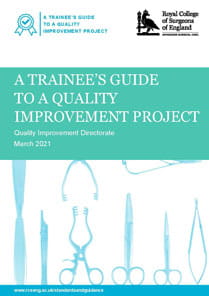Quality improvement in surgery

Brief description
Every hospital environment contains opportunities to improve patient care. Existing and novel processes and ways of working require constant re-evaluation and adjustment to ensure areas of weakness are not overlooked; a structured quality improvement (QI) project provides a framework to facilitate this. In a healthcare setting, a QI project can be undertaken by any member of the hospital trust.
Although the process around QI project can be intimidating, it is a valuable tool for improving patient care and standards within any environment. With the recent significant change in clinical practice resulting from the COVID-19 pandemic, this has been made even more apparent.
Our good practice guides build upon evidence of what has worked or not in implementing QI within healthcare settings over the past few decades, and provide practical recommendations on how surgeons can facilitate change through QI methodologies, including identifying common barriers and how they can be overcome.
Who are these guides for?
They are intended for all surgeons and members of the surgical team who would like to undertake a quality improvement project.
What can I learn from these guides?
The two guides describe the basic principles of quality improvement in surgery including methods for identifying areas for improvement and a step by step process for organising a quality improvement project in a hospital environment. A detailed case study of a successful quality improvement project undertaken by surgical trainees is also presented from conception to completion, including benefits, mistakes and lessons learned.


